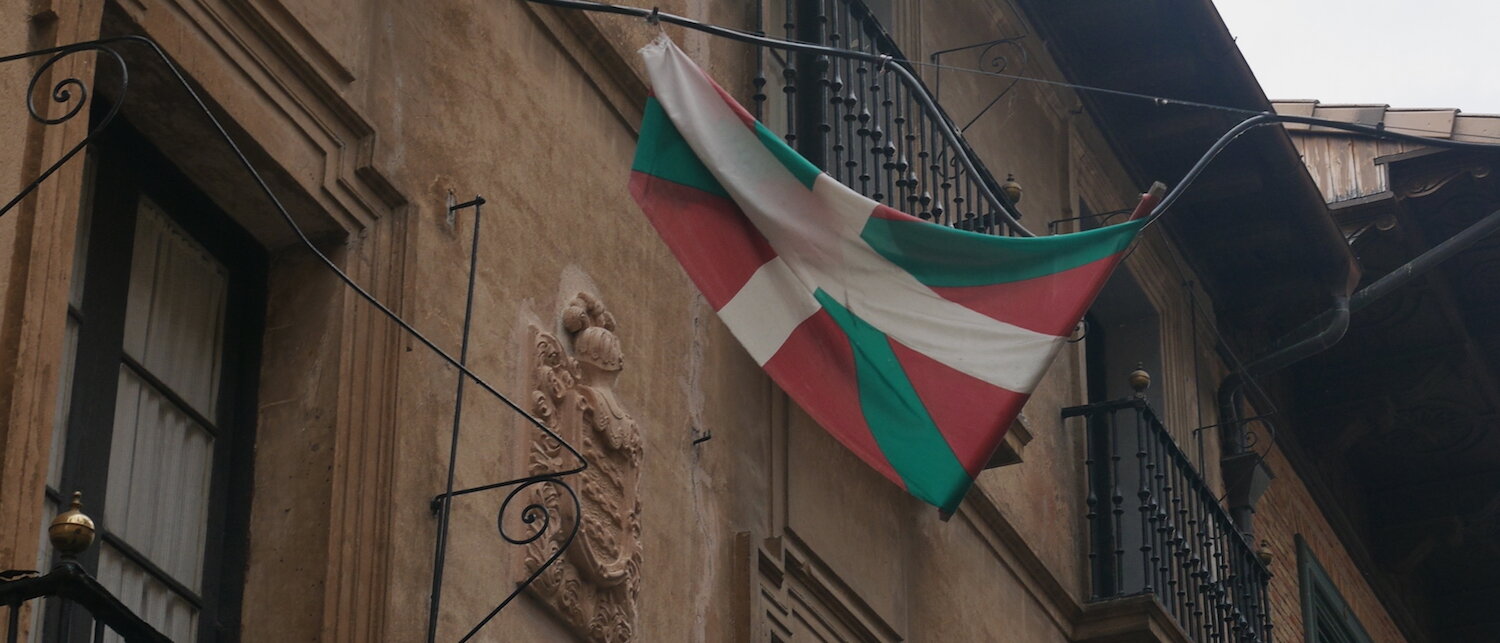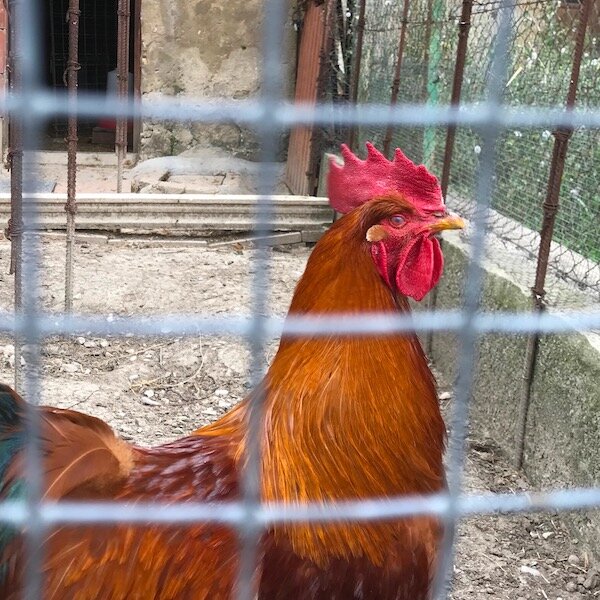Things felt differently on the other side of “Forgiveness Ridge.”
For starters, loose gravel on a hard trail encouraged my feet to move in new directions. Grk rk k kgrk, shuuuuuuuuuuuuush!
I came down like a hot albatross, all appendages flailing.
Bob, wide-eyed, just held his breath.
View on the descent from Alto de Perdón. Central Spain opened up before our eyes.
Beyond the experience of the feet, the experience of the eyes suggested that the land beyond “Forgiveness Ridge” was morphing. The forested mountains of the Pyrénées melted into rolling grasslands. Oh, there were still big hardwoods—irregular groups of beech and oak in groves, fencerows, stream beds and the like—but a warm breeze revealed the silver-green flicker of the olive for the first time. Fig trees appeared too, along with grape rows. We were sliding from France to Spain, from a cool European clime to a warmer and more arid environment. It was recognizably Mediterranean.
Figs trees with fruit appeared.
Tik, tik, tik.
Our metal walking sticks struck cobblestones as we passed from trail to village to trail again. The names of these villages were unknown to us: Uterga, Muruzábal, Obanos. But each had the features that we would come to expect of the rural countryside: a group of shuttered houses, an albergue, a bar, a grocery, an old church.
Apart from stopping at fountains to fill our water bottles, we passed through these. Our goal was to overnight in Puente la Reina, “Bridge of the Queen.” The bridge, according to the guide book, crossed the El Río Arga. This river had been flanking us since before Pamplona; we had crossed it once, in its infancy, on the “rabies bridge” in Zubiri (see post here for part of the story about our brush with rabies).
The lay of the land between Alto del Person and Puente la Reina. Image courtesy of Google Earth.
It grew hot as the sun climbed overhead. It was a Mediterranean July after all. Our conversation turned to possibilities for the overnight.
A theme developed: “Wouldn’t air conditioning be great?”
Neither Bob nor I had slept well since leaving France. Maybe a single night in a cool hotel room without a mess of bunkmates would “catch us up”?
We pulled into Puente la Reina and stopped at the first hotel we saw. The sign read Hostal Zubi XXI. We were cooked.
If you see this place, keep walking. Image courtesy of Kayak.com (accessed 10/25/2021).
The desk, however, was abandoned. I hunted around until a found a responsible party. He was in his 20s, had dark hair, olive skin, and spoke English. “Do you have air conditioning and wifi?” I asked.
“Of course.”
I was elated. I slapped Euros on the counter, got the key, and went upstairs to the room.
The hall was dark and vacant and hotter than Hades.
The room was the same, except it had two beds and a private bath. There was no wifi. It had a stale odor.
I went back downstairs and hunted down the responsible party. “Where’s the air conditioning?”
“Yes. Someone will work on it later.”
We opened the windows to remove the stuffiness and went out for food.
The street leading to the Iglesia de Santiago in Puente la Reina.
When we returned there was still no air.
Once again, I hunted the lad. He was in the building next door. He informed me the air wasn’t going to work after all and that we could have breakfast for free instead. Come down at 7:00 in the morning, he said. Free breakfast, he said.
Back in the room I informed Bob.
He was cynical. “That’s the oldest trick in the book.”
The night was hot. I lay on my back and listened to myself sweat.
Next morning, Bob and I loaded our backpacks and went to the kitchen at the appointed time. The room was dark. The chairs were on the tables. We waited a while but no one appeared.
It was a lesson in hotels and “air conditioning” and, most of all, paying without seeing.
Symbols and language of Basque independence were visible here and there.
I read about a Frenchman named Jacques de Troya. Documents from 1350 indicate that he was hung in Puente la Reina for stealing money, books, and clothes from Camino pilgrims. I wonder if any hostellers ever suffered the same fate?
¡Buen Camino!
We have a full slate of trips to the Bible Lands ready to launch in 2022. One departs New York for Israel on March 12 and returns on March 25. This high-energy study tour will move light and fast, so pack your hiking shoes! Walt Harper, professor from Central Christian College of the Bible and Jeff Snell from Johnson University will assist with teaching duties on this one. For more information click here or contact me at markziese@gmail.com.







